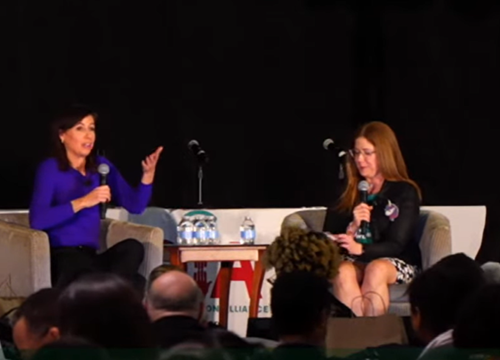
For decades, ILSR has recognized that communities need to be engaged on Internet access issues to make sure that everyone – from low-income, historically marginalized residents to small businesses and even municipal departments – have the Internet access they need to thrive in the digital age.
Digital equity is essential to help resolve other challenges and the current chasm between the haves and have-nots makes solving many other challenges – like education – more difficult.
To further the quest for greater digital inclusivity, recently ILSR’s Community Broadband Networks Initiative Director Christopher Mitchell put together a panel for Net Inclusion 2024, a conference convened by the National Digital Inclusion Alliance (NDIA) that drew 1300 attendees and was by far the largest digital inclusion conference held in many years of doing this work.
Entitled “Without Political Power, There is No Path to Digital Equity,” the panel was originally going to focus on the importance of structural change – and how we cannot ensure everyone is connected by relying solely on the networks already present in neighborhoods that see quite low broadband penetration. Instead, the panel discussion went a bit deeper than that and landed on an observation often made by Joshua Edmonds from Digital C in Cleveland. To paraphrase Joshua, we cannot coupon our way to digital equity.

Joshua, along with Shayna Englin, Director of the Digital Equity Initiative at the California Community Foundation, were the core of the panel. (It was hoped that they would be joined by Amalia Deloney who ultimately could not attend). As NDIA put the panels together, they asked if we could bring in two wonderfully knowledgeable people from Chattanooga, Tennessee who were also focused on political change – Dan Ryan of The Enterprise Center and Melanie Silva, COO of Hinton & Company.
The discussion includes constructive criticism of the movement for digital equity, as well as more specific criticism of the decision to move the Net Inclusion conference from Chattanooga to Philadelphia. That decision was entangled with - and justified by - the concerns of some regarding safety in the wake of attempts in the Tennessee Legislature to revoke the rights of Transgender individuals, among others. The panel felt it was important not to ignore those issues as we wrangled with the larger issue of building a better society with more rights and opportunities for everyone.
The panel wrestles with real questions of how we can organize in 2024 to resolve the problems we face - how we can reconcile that some companies are both an ally on some issues while also being the strongest opponent of actually resolving the problem. As one example of the nuance covered by the panel, Christopher had this to say about Comcast:
“Comcast is the best of the big monopoly national companies. Comcast has hired people who feel in their core that they want to use some of the power that Comcast has to connect people."
"Comcast's Internet Essentials has done more than all the other big companies combined. Comcast has also made sure that thousands of people in Chattanooga are not connected. Tens of thousands, perhaps hundreds of thousands, around Chattanooga have DSL or satellite because Chattanooga is a municipal network and Comcast doesn't want to see that expand into the areas where Comcast is not interested in serving.”
The panel asked difficult questions and wrestled with the challenges in ways that are important, even as the panel tried to be respectful of allies doing the work but who have come to different conclusions.

In the days following that panel, Shayna joined our Connect This! show to further reflect on the entire event. In that show, they spent a significant time wrestling with the frustration of Chris and Shayna having watched FCC Chair Rosenworcel taking no responsibility for her lack of a strategies on digital equity - whether building a foundation to protect the now-expiring Affordable Connectivity Program or developing the long term strategy that she declared was ultimately needed regardless of ACP.
We remain concerned that many of the well-meaning and hard-working people focused on digital equity at Net Inclusion are not on a path that can lead to the world they want to live in.
And so in the spirit of learning from one another while holding respectful space for varying viewpoints, we hope that these conversations will help to reevaluate how we will get there. We hope you find this discussion useful and respectful of the larger movement despite disagreements on some important issues. Below you can listen to the audio of the panel. (Special thanks to Matt Purdy for cleaning up the audio so we could post it to the Community Broadband Bits podcast feed).
For a follow-up discussion watch our most recent on the Connect This! Show below:
Header image courtesy of Kevin Ku, CC0 1.0 Universal Public Domain Dedication
Inline screenshot of Jessica Rosenworcel at Net Inclusion 2024 courtesy of NDIA
Inline image of the word "goals" written on chalkboard, Attribution-ShareAlike 3.0 Unported







